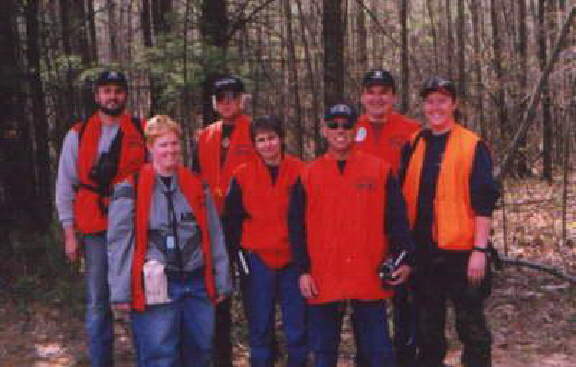
|
NICOLET
SEARCH
TEAM, Inc. |

|
| "Always Ready, So That Others
May Live" |
|
HOME
MEMBERSHIP
EQUINE UNIT
MAN TRACKING UNIT
WILDERNESS
TRIP SAFETY
INCIDENT
REPORTS
TEAM
MEETINGS
PUBLIC RELATIONS
TEAM
CREDENTIALS
TEAM PICTURES
TEXT MESSAGE
SPONSORED
TRAINING
INTERACTIVE
TRAINING
SAR FORMS, MANUALS
& DOCS
SAR
RESOURCES
SAR
LINKS
APPLICATION
CONTACT US
NEWSLETTERS
OUR
SUPPORTERS "Donate Now"
NICOLET WALK / RUN
HOME
|
BE PREPARED
Preparing to visit the Wilderness
1.
Leave word
where you are going and when you will be back:
-
Give complete route details of where you
are going to close relatives/friends.
-
Tell them about anyone's special medical
conditions e.g. diabetes, asthma.
-
Tell them when you plan to return and
have them call authorities if overdue.
-
Leave a note 'inside' your car or truck
outlining your hiking plans. For security reasons, it
is not necessary to place the note so it can be read
through the windshield. If you're missing and we find
your car, we will get inside to read your note.
2.
Take the
correct map and a compass. Know how to use them.
3.
Take
appropriate clothing and footwear.
-
In the Wisconsin North woods it is
especially important to avoid hypothermia. Weather
changes rapidly in all seasons.
-
Always take a waterproof wind
breaker, and clothing that can keep you warm when wet,
e.g. wool.
-
Avoid cotton which absorbs perspiration
and rain and becomes cold when wet.
-
Avoid cotton jeans.
-
Even in warm weather in the woods, be
prepared for rains and night cold if stranded. Large
plastic trash bags can substitute for rain gear in an
emergency.
-
Take drinking water, take drinking
water, take drinking water! Water is much more
important to your survival than food.
-
Take high calorie/high protein snacks to
maintain energy.
-
Don't overestimate your abilities.
-
Always allow time for the unexpected,
e.g. thick scrub, rock lines, streams, swamps.
-
Don't go faster than the slowest member
of your group.
-
At regular intervals do a head count of
your group.
-
Don't split up your group during a hike.
There is safety in numbers.
-
Don't leave an injured person alone. A
group of three or more will allow one to look after
the injured while the other goes for help. If there
are only two of you, do not leave the injured person
alone unless you know exactly the route to get help.
Stay on trails, roads, etc.!
4.
Stay put when
lost.
-
Find a campsite (with nearby water, if
practical) and that will be visible from a helicopter.
-
Wave vigorously (a bright or white
shirt, jacket, etc.) at any helicopters - they are
probably looking for you!
-
Don't
forget
if you are overdue to phone home from the first phone
you come to. Make sure, if you are overdue, that you
notify local authorities that you are safe.
|
A Good
Survival Kit
A good survival kit should be compact, lightweight
and contain the bare necessities. Ideally, much of what you pack
should serve more than one purpose. Look around your home and use
your imagination. Prescription medication bottles make nifty
waterproof containers, and mint tins hold an amazing array of
small items. Here are some things to consider:
- Charged cell phone. Whether you keep it in your pocket or
backpack, enclose it in a waterproof plastic bag.
- Compass
- Whistle
- Fire starting materials disposable lighter, waterproof
matches, magnesium and steel, candle, fire starter cubes, cotton
balls soaked in petroleum jelly (all packed in a waterproof
container). Bring three different kinds of fire starters in case
a method fails to work.
- Orange plastic trash bag can be used as poncho, ground
cloth, shelter or to signal your location.
- Mini-flashlight
- Signaling device mirror, foil, glow stick, plastic
neon-colored tape
- Knife or multi-tool
- Poncho, space blanket or tarp
- Parachute cord or rope (about 25 ft.)
- Water purification tablets
- Several waterproof bags in varying sizes to keep things dry
and segregate items that get wet
- Prescription medication
- First-aid kit: antiseptic wipes, assorted bandages, tweezers,
pain reliever, insect repellent, sunscreen, lip balm, tablets
for diarrhea/upset stomach, safety pins
Other personal items to
consider if you have room in your backpack are high energy foods
like granola bars, candy and fruit; sunglasses; extra socks; rain
gear; hat; and gloves. Bikers should always carry a basic repair
kit to fix flat tires and make minor repairs.
Starting
a fire
Pick a sheltered spot out of
the wind and at least six feet from any fuel source especially
your shelter! Clear the area of debris and surround it with rocks,
if you can find them to contain the fire. Rocks will also retain
heat for several hours and radiate it to a nearby shelter.
Gather dry tinder, kindling
and fuel:
- Tinder has a low flash point and is easily ignited. Things
like dryer lint, cotton threads, dry wood powder, sawdust, wood
shavings, unraveled string, wool fuzz, dry shredded bark,
crushed fibers from dead plants, cotton balls smeared with
petroleum jelly, steel wool and foam rubber make good tinder.
Always carry some tinder with you in a waterproof container.
- Kindling has a higher combustion point and should be mixed
with tinder. Paper from your wallet, dollar bills, pine cones,
pine needles, dry twigs, wood shavings, dry bark and dry grass
make good kindling.
- Fuel ignites and burns slowly. Its best to use dry, dead wood
like the insides of fallen trees and large branches. Green wood
will work, but will produce a lot of smoke; split it if you can
and mix it with dry fuel.
Build a teepee of small
dry twigs and branches with an opening in one side. Shelter the
tinder in a small ball of dried grass. The easiest igniter is a
disposable lighter. When the tinder catches, shove it under the
teepee and add bits of tinder and small kindling until the fire
is burning. If you chose to pack a candle, it can be a
life-saver for starting a fire. Add fuel and keep replenishing
it until the fire is well established.
The Nicolet Search Team, Inc. is a recognized
non-profit organization and holds a Federal 501(c)(3) letter of
Tax Exemption.
 <<
Give our Team a donation now through a safe and secure website
- "Network for Good"
<<
Give our Team a donation now through a safe and secure website
- "Network for Good"
Copyright
Nicolet
Search Team, Inc. 2013

